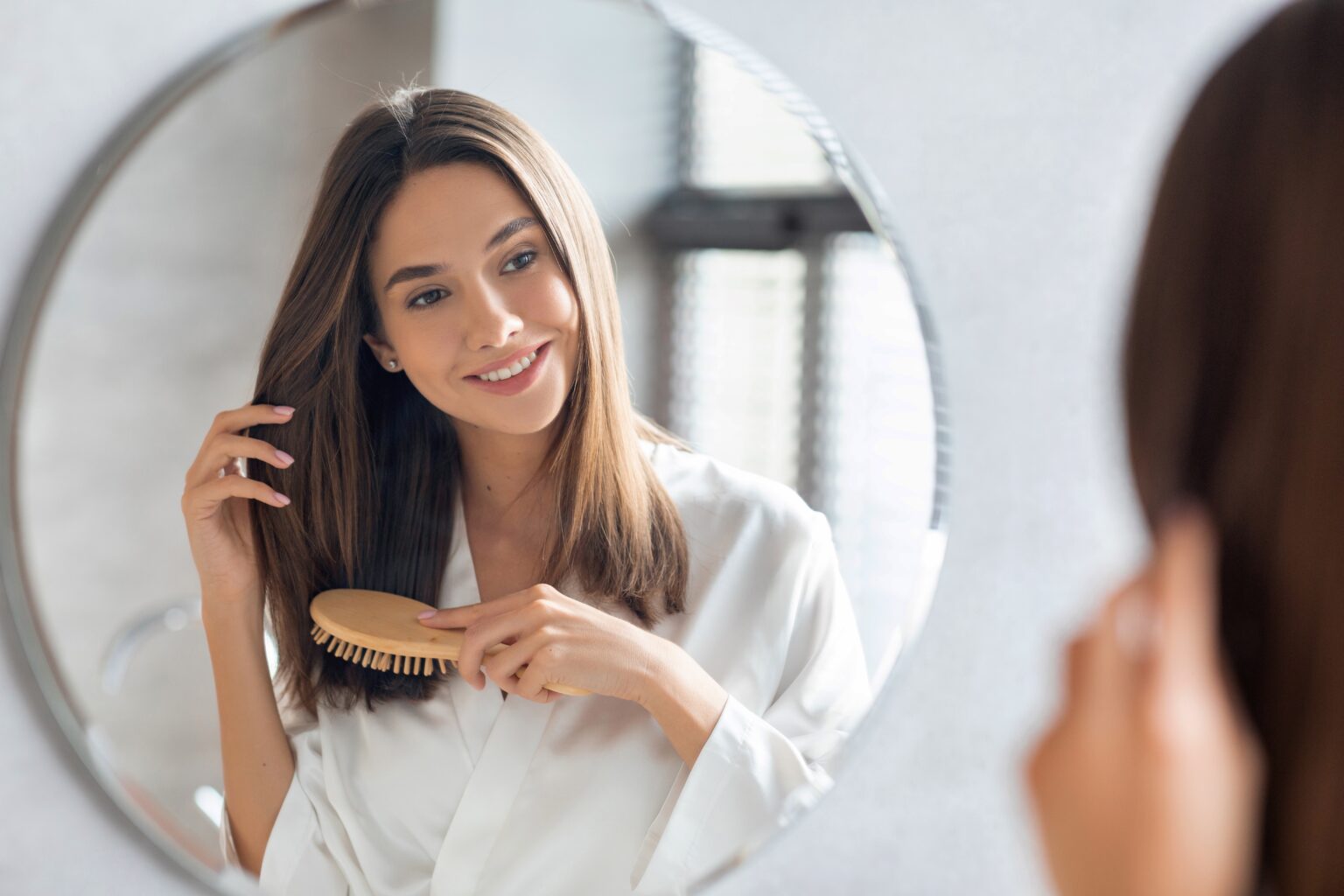Achieving faster hair growth is a common goal for many, driven by the desire for a fuller, longer mane. While genetics play a crucial role in determining hair growth rate, specific practices and treatments can help maximise hair growth potential. The coat’s lifecycle includes the anagen phase, where active growth occurs. Extending this phase can lead to improved hair length over time.
A combination of a balanced diet rich in vital nutrients, the use of specific hair care products, and the adoption of hair-friendly lifestyle habits contribute to overall hair health. Vitamins such as biotin and vitamin E and minerals like zinc and iron are often highlighted for their role in supporting hair structure and growth. Additionally, topical treatments like essential oils and scalp massages are touted to stimulate the scalp, potentially positively influencing the hair growth cycle.
Professional advice often suggests regular hair trimming to prevent split ends, which can lead to breakage and slower apparent growth. Stress management and minimising heat styling tools also play a part in maintaining a healthy scalp and hair. While it’s important to understand that results may vary for individuals, incorporating these hair care practices provides a foundation for achieving stronger and potentially faster-growing hair.
Understanding Hair Growth
Hair growth is a complex process influenced by various factors such as genetics, age, and the distinct phases of the cycle. By understanding these elements, one can better grasp how hair grows and why it may vary among individuals.
The Hair Growth Cycle
Hair undergoes a lifecycle comprising several phases. This cycle includes:
- Anagen Phase: The active growth period for hair, lasting between 3 and 10 years.
- Catagen Phase: A transitional stage lasting a few weeks, during which hair stops growing and detaches from the blood supply.
- Telogen Phase: The resting phase, lasting around three months, where old hair rests while new hair begins the growth process.
- Exogen Phase: This is the part where hair sheds naturally, occurring alongside the telogen phase.
These stages occur asynchronously, meaning different hair follicles are in various phases of the cycle at any given time.
Influence of Genetics on Hair Growth
Genetics are crucial in determining hair texture, density, colour, and growth rate. For instance, genes influence the longevity of the anagen phase, which directly correlates to how long hair can grow before it enters the catagen phase.
Age-Related Hair Growth Changes
As individuals age, their hair’s growth cycle changes. Specifically, the anagen phase tends to shorten, leading to slower hair growth and increased hair loss. Age-related hormonal changes also contribute to these variations in hair growth patterns.
Nutritional Factors for Healthy Hair
Optimal hair growth is heavily influenced by one’s nutritional intake, with specific vitamins, proteins, and minerals playing pivotal roles in the health of hair follicles. Imbalances or deficiencies in these nutrients can lead to noticeable changes in hair growth and health.
Importance of Vitamins
Vitamins are fundamental to maintaining healthy hair growth. Vitamin E, for example, acts as an antioxidant, helping protect hair follicles against damage from free radicals. Biotin, or vitamin B7, is often associated with improved hair growth and strength. Folic acid, another B vitamin, is vital for healthy cell growth, including the hair follicles cells. One must also pay attention to the importance of vitamin A, which supports the production of sebum that keeps the scalp moisturised and hair healthy. It is crucial to moderate vitamin A intake, as excess can have the opposite effect, potentially leading to hair loss.
Role of Protein in Hair Growth
Hair is primarily composed of a protein called keratin, which underscores the importance of protein in the diet for hair growth. Consuming adequate protein levels is essential because it provides the amino acids necessary for the body to build keratin. Foods rich in protein, such as eggs, salmon, and lentils, are excellent sources that can contribute to hair’s strength and growth rate. Collagen peptides are another source of amino acids and may support the integrity of the hair’s structure.
Effects of Deficiencies on Hair Health
Nutrient deficiencies can visibly affect hair health. Iron deficiency is one of the most common deficiencies associated with hair loss, as iron is crucial for producing hair cell protein. A lack of zinc can lead to hair shedding because this mineral helps hair follicle recovery. Adequate intake of omega-3 and omega-6 fatty acids in foods like salmon and avocados is essential as they provide the oils that keep scalp and hair hydrated. Healthy fats are also necessary for absorbing specific vitamins and minerals crucial for hair health. Therefore, a well-rounded diet that includes a variety of nutrients is the best approach to maintaining both scalp and hair health.
Hair Care Practices
In the pursuit of faster hair growth, establishing a regimen focused on the health of the hair and scalp is crucial. From the choice of hair care products to the application method, every step promotes optimal hair growth.
Proper Hair Cleansing
Using the right shampoo is the foundation of good hair care practices. It’s advisable to select a shampoo that matches one’s hair type and to consider sulphate-free options to avoid stripping natural oils from the scalp. Regular cleansing prevents build-up, which can impede hair growth. Scalp massages while shampooing can stimulate circulation and promote healthy follicle function. It should be noted that overuse of dry shampoo can lead to dandruff and scalp build-up, potentially affecting hair growth.
- Shampoo: Opt for sulphate-free varieties for gentle cleansing.
- Scalp Massage: Use circular motions to stimulate blood flow.
Strategic Hair Conditioning
Applying conditioner post-shampooing is essential for moisturising the hair and preventing breakage. Particular focus should be given to the ends of the hair to keep it healthy, which can help reduce the need for frequent trims. While silicones in some conditioners can create a smooth appearance, they can also cause build-up; thus, select products carefully. A leave-in conditioner can offer added moisture and protection throughout the day.
- Conditioner: Focus on the ends to prevent breakage.
- Leave-In Conditioner: Apply to add further hydration.
Beneficial Hair Treatments
Treatments such as hair masks rich in natural oils like argan, jojoba, rosemary, and castor oil can deeply nourish the hair and scalp. Ingredients such as protein are vital for hair health, so a mask that includes it can be advantageous. For those experiencing hair loss, minoxidil (found in products like Rogaine) can be considered under the guidance of a healthcare professional. Avoid excessive use of hair products and extensions to minimise stress on the follicles.
- Hair Masks: Apply masks with natural ingredients and proteins.
- Hair Loss Treatments: Consult a professional before using products like minoxidil.
Lifestyle Considerations
Adopting a healthy lifestyle is essential for promoting hair growth. Specific habits related to stress, sleep, and lifestyle choices directly affect hair health.
Managing Stress for Hair Growth
Chronic stress disrupts the hair growth cycle, leading to hair thinning and loss. Individuals need to find effective stress management techniques such as:
- Meditation: Regular meditation can reduce stress levels, which may help maintain the normal function of hair follicles.
- Exercise: Physical activity increases blood flow to all body parts, including the scalp, promoting healthy hair growth.
The Impact of Sleep on Hair Health
Adequate sleep is critical for one’s overall health, including the health of their hair. Sleep deprivation can weaken hair follicles, undermining hair’s ability to grow effectively. Individuals should aim for:
- 7-9 hours of sleep per night to support the body’s regenerative processes that affect hair health.
- Consistent sleep patterns, going to bed and waking up at the same time each day to regulate the body’s internal clock.
Addressing Harmful Habits
Certain habits like smoking and excessive caffeine consumption may contribute to poor hair health and hair loss treatment ineffectiveness. Individuals seeking healthy hair growth should consider the following:
- Quitting smoking: Smoking has been linked to poor circulation and reduced blood flow to the scalp, hindering the supply of nutrients necessary for hair growth.
- Moderating caffeine intake: While moderate caffeine consumption can be part of a healthy diet, excessive consumption may negatively impact sleep and stress levels.
Advanced Hair Growth Techniques
In pursuit of enhanced hair growth, individuals turn to advanced strategies incorporating nutritional supplements and medical treatments known for their efficacy in stimulating hair follicles and improving hair health.
Supplemental Support
To reinforce hair growth from within, specific supplements have been recognised for their positive impact on hair strength and texture. Biotin, a B vitamin, is known to bolster keratin infrastructure, potentially leading to improved hair growth. Similarly, protein supplements—as hair is primarily composed of keratin, a type of protein—may assist in the support of healthy hair. Introducing antioxidants through accessories can also protect hair follicles from environmental stressors that impede growth.
- Recommended Supplements: Biotin
- Protein (e.g., collagen peptides)
- Antioxidants (e.g., Vitamins C and E)
In addition to ingestible supplements, topical applications like essential oils have gained traction. Peppermint oil, in particular, is lauded for enhancing circulation to the scalp when used during scalp massages. This, in turn, may trigger an increase in the hair’s active growth phase. Another noteworthy oil is rosemary, which, akin to conventional hair growth medications, could be beneficial in fostering hair growth.
- Topical Supplements: Essential Oils: Peppermint oil, Rosemary oil
- Fats are often applied using aromatherapy techniques, with the dual benefit of hair care and a soothing sensory experience.
Exploring Medications and Treatments
Investigating pharmaceutical avenues and prescribed medications such as minoxidil and finasteride have shown promise in promoting growth speed and delaying hair loss. However, due to potential side effects, these medications must be used with medical guidance.
Bond-building treatments like Olaplex have been developed to repair and protect hair structure. These treatments target the disulphide bonds within hair strands, reducing breakage and loss to retain hair length and facilitate growth.
Platelet-rich plasma therapy (PRP) is a more advanced treatment that leverages the body’s natural healing properties. By injecting concentrated platelets into the scalp, PRP may strengthen hair follicles and accelerate the growth cycle.
- Notable Medications and Treatments: Minoxidil
- Finasteride
- Bond-building Treatments (e.g., Olaplex)
- Platelet-rich Plasma Therapy
In conclusion, while traditional hair care practices are foundational, these advanced techniques and treatments offer a sophisticated approach to achieving quicker and healthier hair growth. It is, however, always advisable to consult with a healthcare provider before starting any new supplement or treatment regimen.
Maintaining Scalp and Hair Health
A healthy scalp is the foundation of hair growth while protecting hair from damage is crucial for retaining length and strength.
Importance of Scalp Health
A healthy scalp supports hair follicles, bolstering their ability to grow hair. Scalp massages stimulate blood flow, enhancing the delivery of nutrients to the scalp and potentially speeding up the hair growth cycle. Incorporating oils like peppermint oil can increase circulation, providing a conducive environment for hair growth. Rosemary is another natural ingredient that strengthens circulation to the scalp, further reinforcing hair health.
Regularly using gentle shampoos and avoiding harsh chemicals preserves the scalp’s natural balance. Wet hair is more susceptible to damage, so it’s advised to refrain from brushing hair when wet to avoid unnecessary breakage.
Combating Hair Damages
To mitigate hair damage, individuals should minimise the use of heat styling tools, which can weaken the hair’s keratin structure. Applying a heat protectant to shield the hair from high temperatures is essential when using these tools.
Bleaching and other chemical treatments can significantly harm the hair fibre. When one chooses to bleach their hair, it’s crucial to follow up with deep conditioning treatments to restore moisture and elasticity.
Consuming foods rich in sunflower seeds provides the hair with essential fatty acids, vitamin E, and antioxidants, supporting hair strength and texture. The body uses these nutrients to build proteins like keratin, which is vital for hair structure and resilience.
By maintaining scalp health and reducing hair damage, individuals pave the way for more robust, faster-growing hair.
Understanding Hair Loss and Regrowth
When considering interventions for hair loss and aiming to promote regrowth, it is vital to understand the contributing factors and effective treatment strategies.
Common Causes of Hair Loss
One frequently reported cause of hair loss is a hormone imbalance, exemplified by conditions such as androgenetic alopecia. This type of hair loss is commonly known as male pattern baldness in men and can present as thinning hair in women. Besides hormonal factors, nutrient deficiencies, particularly a lack of vital vitamins and iron, can lead to hair thinning. Physical and emotional stress also ranks high among the causes of hair shedding. Split ends and other signs of hair damage can exacerbate the appearance of hair loss by breaking the hair shaft, affecting overall hair length.
Strategies for Hair Regrowth
To combat hair loss, evidence suggests minoxidil, the active ingredient in products like Rogaine, can stimulate hair regrowth. It functions by increasing blood circulation to the scalp, thus directly impacting the growth speed of hair. This topical treatment requires regular application over several months for the user to see increases in hair density and a slowdown in hair thinning. Along with medicinal treatments, maintaining a nutritious diet plays a crucial role by providing the hair with essential nutrients. Ensuring proper hair care to prevent split ends and further damage is equally significant in maintaining and improving hair health.
The Influence of External Factors
The growth and health of one’s hair are not solely determined by internal physiology but are also significantly influenced by external factors. These environmental aspects and hair care products play pivotal roles, often overshadowing genetics.
Environmental Impacts on Hair Growth
Various environmental elements can affect hair strength and growth. Air pollution and environmental toxins increase oxidative stress, potentially damaging hair follicles. This stress interrupts the natural growth cycle, crucial for maintaining healthy hair. UV damage from excessive sun exposure can similarly impair follicle health. To mitigate these effects, one can:
- Protect the scalp with hats or specific hair products containing UV filters.
- Perform regular scalp massages to stimulate blood flow, delivering nutrients and oxygen vital for hair regrowth.
Additionally, extreme weather conditions, such as solid sun or cold winds, should be countered with appropriate hair protection strategies, such as using conditioners and oils known to improve hair health, like rosemary oil.
The Role of Hair Care Products
Hair care products directly interact with the hair and scalp, influencing growth rates and overall health. The regular use of appropriate conditioners can help maintain hair’s moisture balance, reducing the occurrence of split ends and breakage. This, in turn, is conducive to preserving length and promoting healthy new growth.
Certain products, like minoxidil, have been clinically approved to support hair regrowth. It’s imperative to discern between products that assist in maintaining hair health and those that may claim to spur growth without scientific substantiation. For instance:
- Genetically determined hair types may require specifically tailored products to see optimal results.
- Regularly trimming hair does not directly cause it to grow faster, but it does help in removing split ends, preventing further damage.
| Hair Care Practice | Expected Benefit |
|---|---|
| Application of growth-stimulating products (e.g., minoxidil) | May encourage regrowth in some individuals |
| Regular cleansing and conditioning | Maintains scalp health and reduces potential impediments to growth |
| UV protective products | Shields hair from damaging environmental factors |
One must remember that while external factors are influential, they synergise with individual genetics and the body’s internal environment. The key is to find a balance that promotes the overall health of the hair.
Myths and Misconceptions
It’s crucial to separate fact from fiction when striving for healthy hair growth. Many myths about hair care persist despite contrary scientific evidence.
Myth 1: Frequent Trimming Speeds Up Growth
It’s a common belief that cutting hair often makes it grow faster. However, hair grows from the roots, so trimming does not affect the growth rate. Regular trims prevent split ends, keeping hair healthy and neat.
Myth 2: Brushing Hair 100 Times a Night Stimulates Growth
While gentle brushing can help distribute the natural oils from the scalp through the hair, excessive brushing may cause more harm than good, potentially leading to breakage and hair loss.
Myth 3: More Protein Leads to Faster Hair Growth
Protein is vital for healthy hair, as keratin—a protein—is a critical coat component. Nevertheless, excessive protein intake will not make hair grow faster, but a balanced diet can support the overall health of hair.
Myth 4: Hair Extensions Cause No Damage
Extensions can cause strain on the scalp and breakage of natural hair if not applied or cared for correctly.
|| Myths About Products and Routines || | — | — | | Caffeine in Hair Products | No conclusive evidence shows that caffeine fosters hair growth. | | Daily Shampooing | It does not necessarily cause severe damage but may strip hair of natural oils. | | Natural Oils | Are beneficial but should be used appropriately for hair type and condition. | | Air-Drying vs. Blow-Drying | Either can be safe; excessive heat should be avoided. |
Supplements can offer benefits if there are nutritional gaps, but they are not a magic solution. A balanced approach to hair care is more effective than quick fixes or unfounded claims.
Conclusion
Regarding enhancing hair growth, individuals must consider a multifaceted approach. Consistent scalp massage and proper hair care play crucial roles in maintaining a healthy environment for hair growth. The significance of a balanced diet rich in protein, iron, and other essential nutrients cannot be overstated.
- Scalp massage stimulates blood flow, which is crucial for follicle nourishment.
- A protein-rich diet supports keratin production, which is fundamental for hair strength.
- Iron and zinc are indispensable for aiding in hair growth and repair.
A gentle hair care routine, including minimising heat and chemical exposure, assists in preventing breakage. When corroborated by scientific evidence, oils like peppermint can further encourage blood circulation. While genetics largely determine hair growth rate, these measures may support optimal hair condition and potential growth.
Note: It’s advisable to verify any hair care treatment or product with a healthcare provider or trichologist to assure its appropriateness for individual hair types and conditions.
In summary, hair growth is a natural process that can be nurtured through attentive care and a considerate approach to diet and hair care practices. Patience remains vital, as changes occur over time rather than instantaneously.
Frequently Asked Questions
These FAQs provide insight into practical strategies for enhancing hair growth, employing natural treatments, and specific methods both genders can adopt to achieve noticeable results.
What methods can increase hair growth speed and volume more effectively?
One can enhance hair growth by maintaining a balanced diet rich in vitamins and minerals, especially iron and zinc, and using topical treatments such as peppermint oil to stimulate circulation to the scalp.
What natural remedies are available for accelerating hair growth within a week?
Natural remedies like scalp massages, which improve blood flow, and hair masks made from essential oils such as lavender or rosemary may aid in boosting hair health, though rapid growth within a week is unlikely.
What techniques can males use to enhance hair growth rapidly?
Males can encourage hair growth by adopting a nutrient-rich diet, possibly supplemented by biotin, and ensuring adequate scalp care through regular cleansing and massages to stimulate hair follicles.
How can one achieve significantly faster hair growth overnight?
Significant hair growth cannot be naturally achieved overnight, but using treatments like overnight hair masks containing natural oils can nurture the hair and promote health, which is vital for growth.
Are there any home treatments to expedite hair growth within seven days?
While substantial growth in seven days is improbable, home treatments like aloe vera application and maintaining hydration can improve hair health and possibly expedite a modest increase.
What steps can I take to strengthen my hair and promote faster growth?
To strengthen hair and encourage quicker growth, one should consume a protein-rich diet, avoid harsh styling practices, protect hair from environmental damage, and ensure that hair and scalp are well-nourished with appropriate hair care products.







